On 24 March 2025, an international symposium: strengthens the role of the United Nations and promote multilateralism was held in Beijing, hosted by the Ministry of Foreign Affairs and co-organized by the China Institute of International Studies (CIIS), the U.N. Association of China, and the Office of the Resident Coordinator of the United Nations Development System in China.
Wangyi, member of the CPC Central Committee Political Bureau and the Minister of Foreign Affairs delivered a written message, Wu Hongbo, former Under-Secretary-General of the United Nations and former Special Representative of the Chinese Government on European Affairs, Shahbaz Khan, Representative and Director, UNESCO Regional Office for East Asia., Siddharth Chatterjee, The UN Resident Coordinator in China, Beate Trankmann, UNDP Resident Representative for China, Stephen Bainous Kargbo, Chief Representative of the United Nations Industrial Development Organization in China, Marina Laurent, Liaison Officer of the United Nations Department of Political and Peacebuilding Affairs in China, Ban Hyun Hee, Senior Adviser, Chief of the Public Partnerships with UNICEF China, Lynn Yang, Deputy Executive Secretary for Programme of the Economic and Social Commission for Asia and the Pacific, Khalil Ur Rahman Hashmi, Ambassador of Pakistan to China, Iven Zyuulu, Ambassador of Zambia to China, Hodan Osman, Ambassador of Somalia to China, Zhou Hong, Member of the Chinese Academy of Social Sciences, Wang Aihua, Deputy Chief Engineer, The China Academy of Information and Communications Technology, Jin Ling, Director, Institute of Global Governance and International Organizations, China Institute of International Studies (CIIS) and more than 100 participants attended the symposium, including envoys from nearly 50 countries, representatives of international and regional organizations in China, United Nations officials, representatives of relevant ministries and commissions, experts and scholars. Xue Lan, Distinguished professor of arts, humanities, and social sciences, Dean of Schwarzman College, and Director of the Institute of Sustainable Development Goals of Tsinghua University (TUSDG) and Zhu Xufeng, Dean of Public Policy and Management, Tsinghua University, Executive Director of TUSDG attended the symposium. Miao Deyu, Assistant Minister for Foreign Affairs of China, Guy Ryder, United Nations Under-Secretary-General, Martin Mpana, Dean of the Foreign Diplomatic Corps in China, Ambassador of the Republic of Cameroon to China
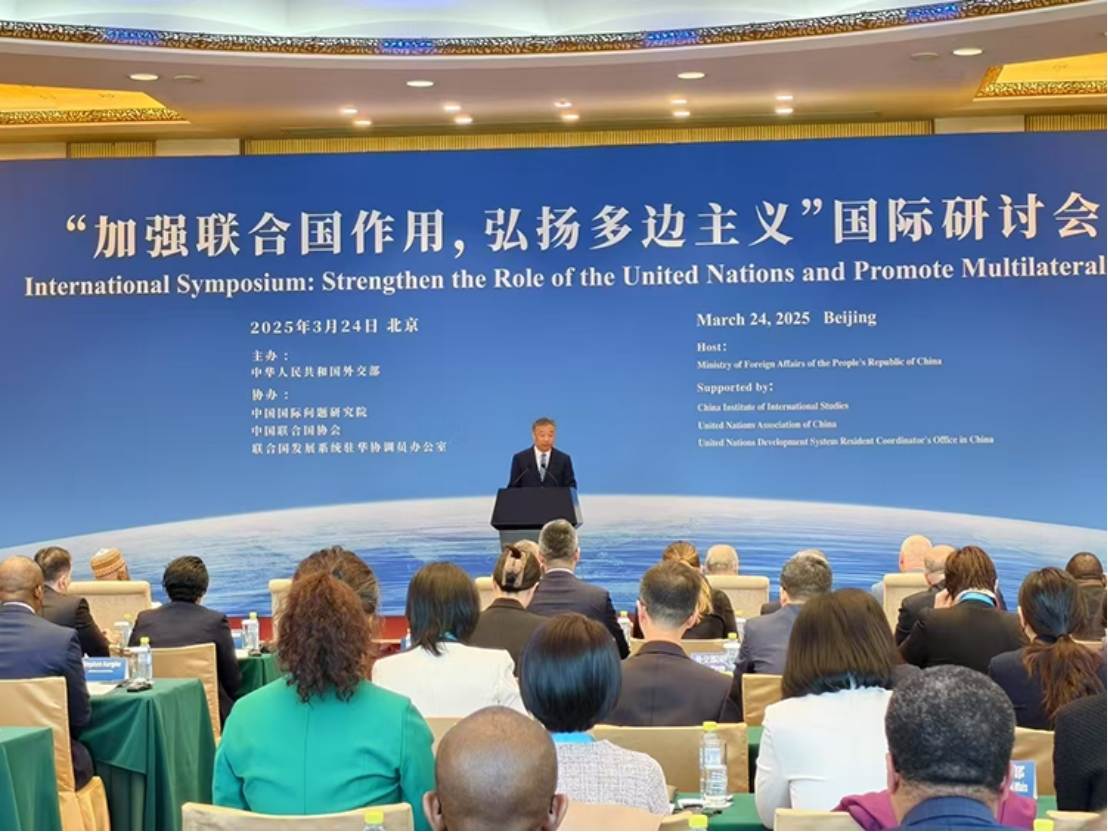
Miao Deyu read out a written message from Minister Wang Yi
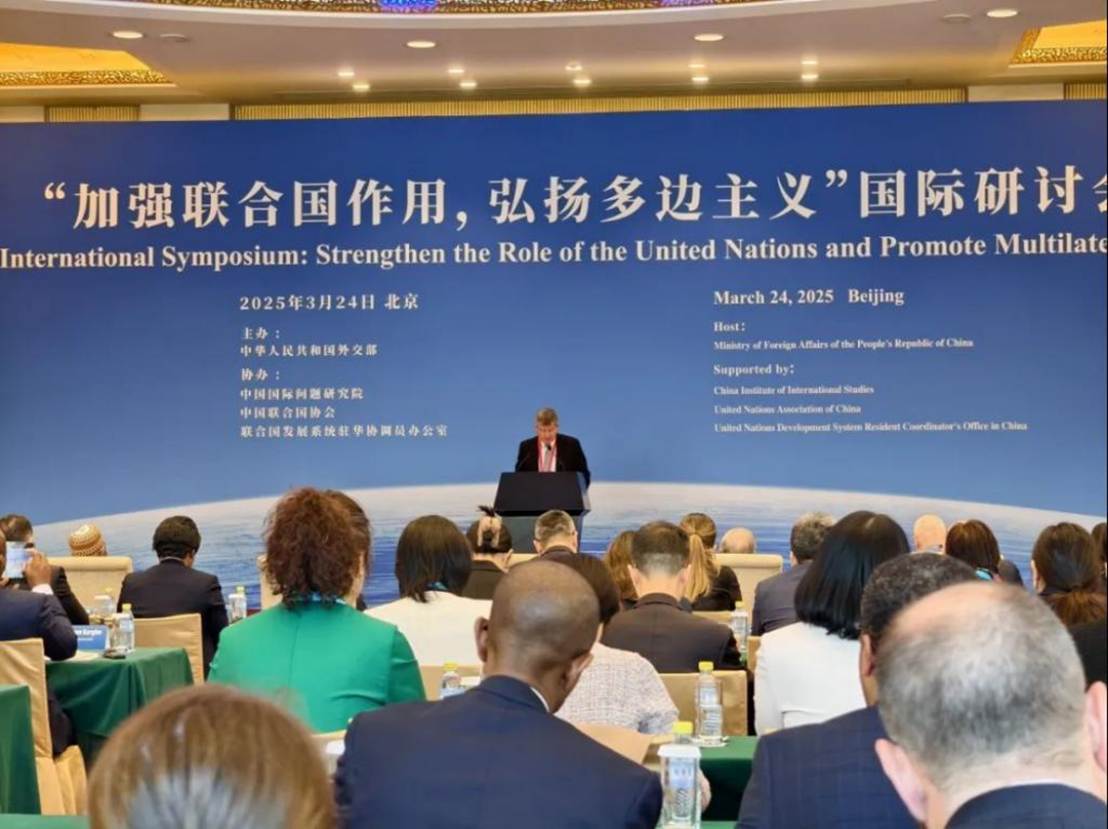
Address by Guy Ryder
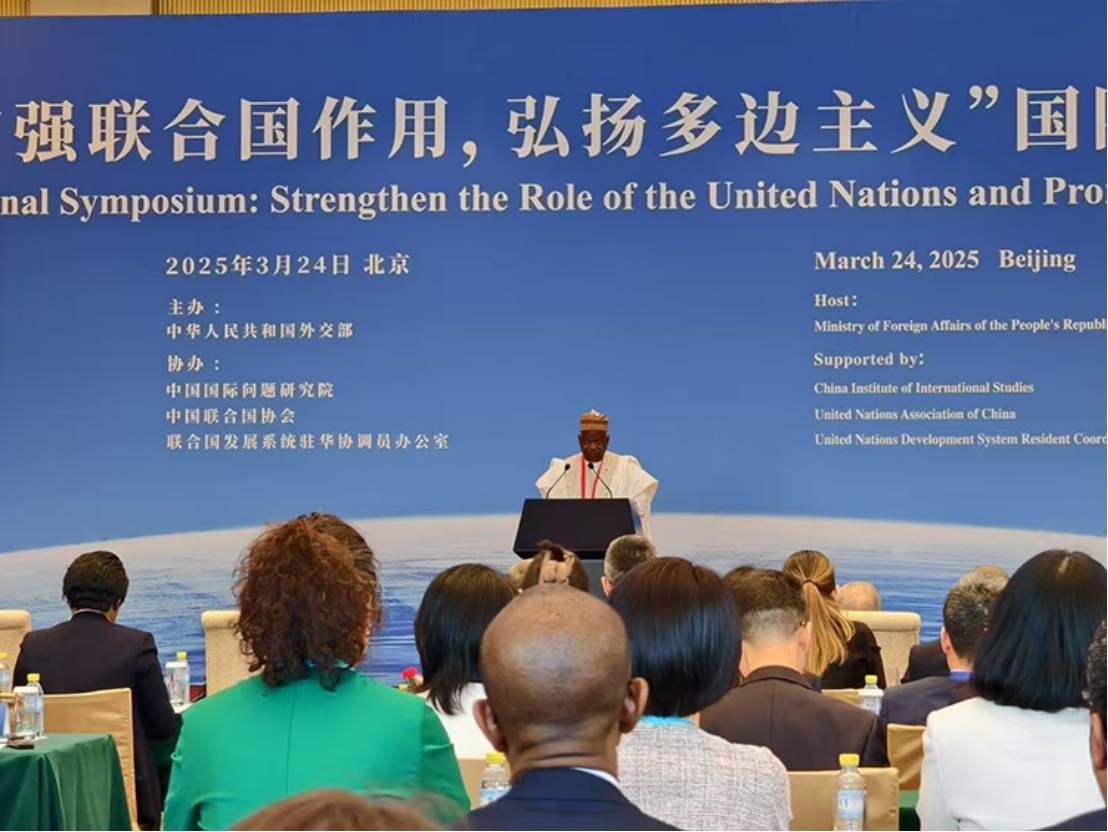
Address by Martin Mpana
Wu Hongbo, former Under-Secretary-General of the United Nations and former Special Representative of the Chinese Government on European Affairs, Siddharth Chatterjee, The UN Resident Coordinator in China, Wang Aihua, Deputy Chief Engineer, The China Academy of Information and Communications Technology and so on moderated the topic discussion.
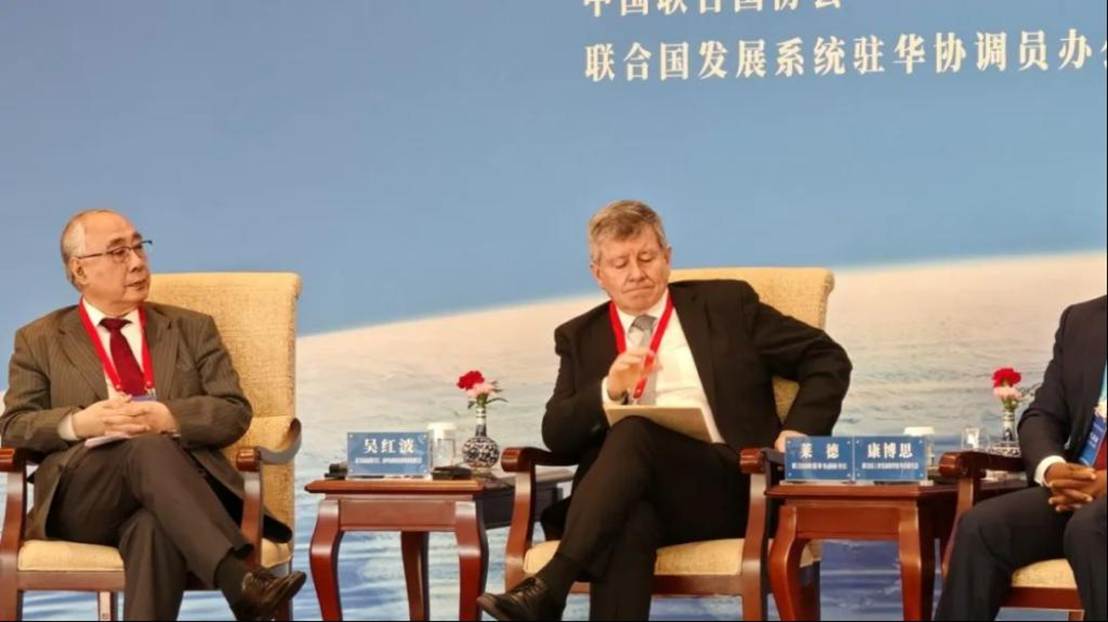
Wu Hongbo moderated the topic discussion (first from left)
The symposium has five topics, covering the United Nations sustainable development agenda, international peace and security, science and technology innovation, youth development and other areas. Among them, Xue Lan and Zhu Xufeng participated in Topic IV - Science, Technology and Innovation and Digital Cooperation: Building an Intelligent Future with Equity and Inclusion, and Topic II - Sustainable Development and the 2030 Agenda for Sustainable Development: Building a Prosperous World through China's Modernization, respectively.
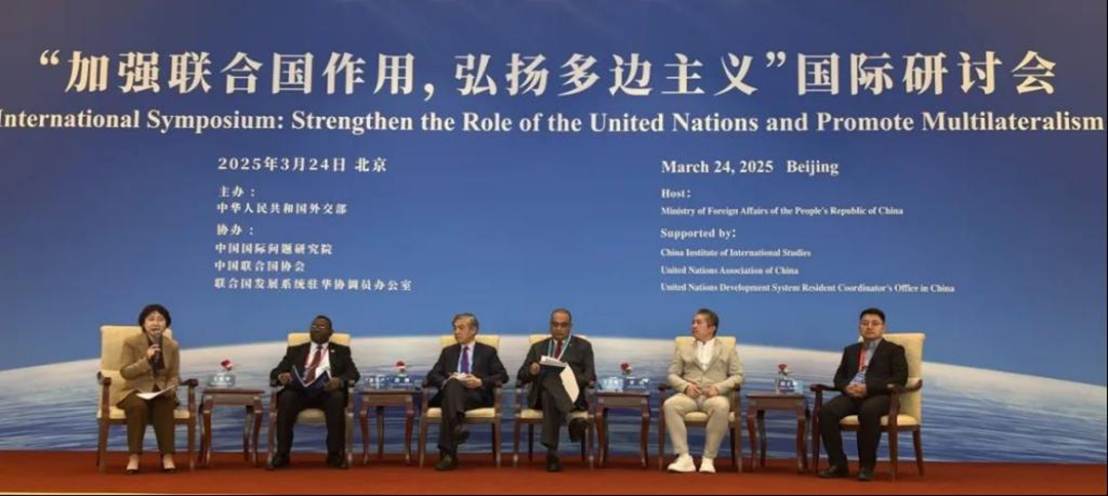
From left to right: Wang Aihua moderated topic 4, with Iven Zyuulu, Xue Lan, Shahbaz Khan and others participated in the discussion
In the discussion session, Xue Lan pointed out that, with the increasingly fierce global competition in science and technology, technological cooperation has gradually been plagued by the risks of politicization and securitization, and some countries have maintained their technological monopoly by constructing barriers to cooperation. This practice not only threatens the resilience of global innovation cooperation, but also deprives developing countries of the right to access advanced technologies to a certain extent. Science and technology should serve the common well-being of all mankind, rather than becoming a tool for a few countries to monopolize advantages. In response to this challenge, Xue Lan believes that China is actively promoting technology inclusion and global cooperation through multilateral collaboration and rule innovation. For example, through the Belt and Road Initiative and the construction of the Digital Silk Road, China is promoting the realization and application of artificial intelligence, cloud computing and smart city technologies in developing countries to help build their digital economy capacity. At the same time, China has also actively participated in the formulation of international technical standards through multilateral platforms, advocated an open, inclusive and non-politicized governance framework, and pushed for the formation of multilateral cooperation mechanisms and inclusive technical rules.
In conclusion, Xue Lan emphasized that, in order to achieve sustainable development in the global competition in science and technology, China should not only continue to deepen its independent technological innovation, but also strengthen its technological diplomacy and international discourse. By telling a good story of “technological inclusion” and “right to development”, and by demonstrating the effectiveness of technological cooperation in contributing to the common welfare of the world, China can make a positive contribution to the construction of a fairer, more inclusive and sustainable global technology governance system.
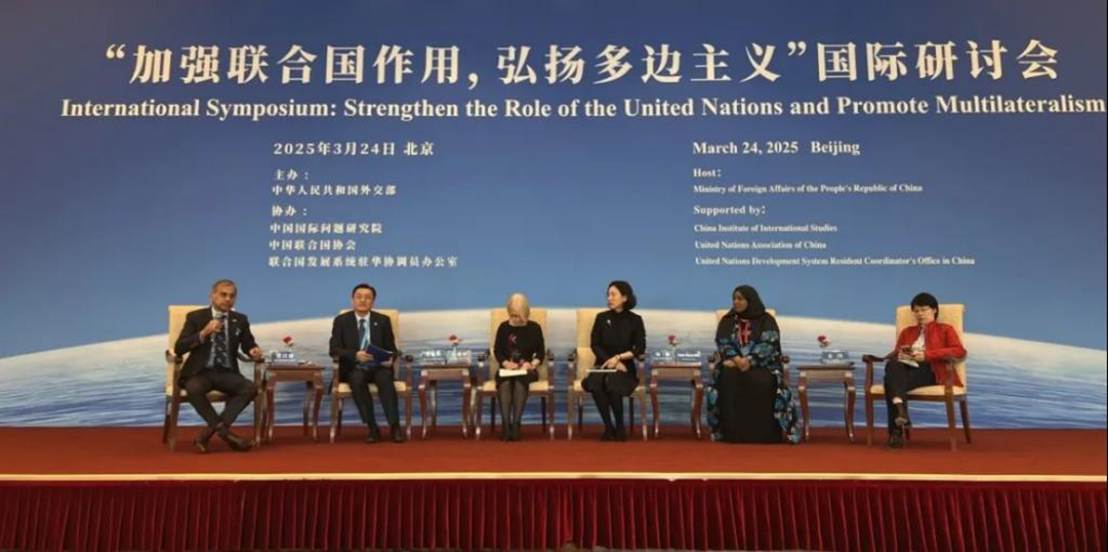
From left to right: Siddharth Chatterjee moderated Topic II, Zhu Xufeng, Beate Trankmann, Yang Ling, Hodan Osman, Jin Ling, participated in the discussion
Zhu Xufeng mentioned that international development issues urgently need to be brought back to the core of the international agenda, and developed countries should realize that supporting developing countries is not only their responsibility, but also an initiative in their own interest. He emphasized that the core of promoting international cooperation should change from traditional selflessness to a “win-win” model, and that developed countries should be aware of the reciprocal opportunities that participation in international development can bring in order to ensure that development issues occupy an important position in the global agenda. Speaking of the challenges facing developing countries, Zhu Xufeng said the biggest obstacle is that developed countries are no longer willing to provide global public goods. Take the closure of the U.S. Agency for International Development (USAID) as an example, an initiative that has severely impacted health, education, and infrastructure in developing countries, especially in the area of global public health. However, the reduction in aid from developed countries has also opened up new opportunities for developing countries. Western aid is often accompanied by dependency problems and is susceptible to political factors. In contrast, China, through its Belt and Road Initiative, South-South cooperation and global development initiatives, offered development-centred and empowering alternatives that offered the prospect of fairer, more inclusive and sustainable global governance.
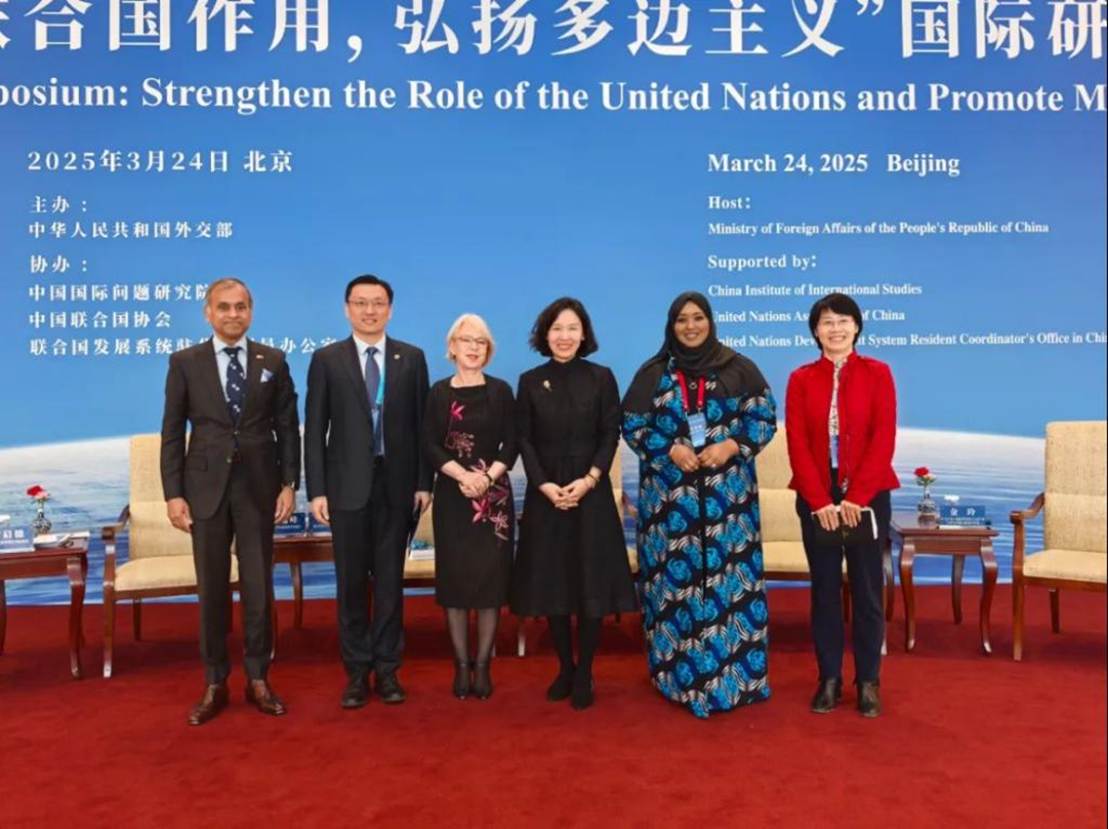
Group photo of guests
The convening of this symposium signifies the determination and action of the international community to unite and cooperate in the face of the multiple global challenges, and highlights the urgent need for all countries to work together to promote multilateralism and strengthen the role of the United Nations. Through in-depth discussions on international development and global governance, the seminar provided valuable ideas and guidelines for action to promote the establishment of a more just and sustainable global governance system.
Source | Ministry of Foreign Affairs, International Cooperation Center, TUSDG

